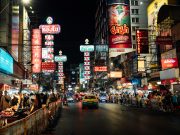(Singapore, 14.08.2025)“Once you hit 35, it’s hard to find a job, but once you reach retirement age, you can easily get one” – this is a saying gaining traction in China. Underlying the saying is a growing worry that an employment trend favoring the elderly and discriminatory against the young has emerged.
The main context to the saying: On September 1, the “Interim Regulations on the Protection of the Basic Rights of Advance-Age Workers” will take effect. This will end the long-tacitly-accepted practice of employers “paying a salary of, say, 8,000 yuan (about S$1428) to an employee but contributing to the person’s social insurance basing on a smaller sum of, say, 3,000 yuan,” an article in the popular news site Zhihu pointed out.

China’s social insurance system is run by the government to provide citizens with basic living support when they age, fall sick., lose a job, get hurt at work, or have a baby.
Come September 1, the government system will automatically cross-check payrolls, taxes, and social insurance data, and companies that continue to underpay social insurance for their employees face threefold penalties: back payments, fines, and social credit downgrades.
But astute employers quickly discovered a “loophole” in the regulations: retirees already have pensions and so they are exempt from the social insurance requirement. If a company pays a retiree worker 10,000 yuan, the hiring cost would be 10,000 yuan, no more. That is nearly 40% cheaper compared to hiring a young worker who requires social insurance, claimed the article.
So, overnight, convenience stores, breakfast shops, and chain restaurants across China started switching to hiring silver-haired staff. One shop selling fried bans in Shanghai offered a monthly salary of 3,200 yuan to “local retirees who speak Shanghainese”— the pay slightly above the minimum wage for part-time workers but minus social insurance.
Even mega employers like the Beijing Universal Studios and McDonald’s joined the fray, hiring “retirees with retirement certificate” for 30 yuan per hour who could stand 4 to 8 hours a day and accept flexible shifts.
The employers are also glad that the “newly-minted elders” born in the 1960s are generally healthy, experienced, and “don’t job-hop quickly like young people.” Data from machinery factories is even more stark: rehiring senior engineers helps save 35% of costs compared to their younger co-workers, while defective product rates drop by 30%.
So, after September 1 one might see large numbers of elderly people going to work, earning both retirement pensions and rehiring wages from companies, while young people remain unemployed, predicted an article in 36 Kr, an online media that reports on technology and entrepreneurship.
Some analysts noted that the current demand for retirees mainly involves simple jobs, such as front line staff in service industries like milk tea shops, KFC, and McDonald’s, whose takers are highly replaceable. However, data also show middle-rank positions such as quality surveyors and advisers are also dished out to aged workers.
According to McDonald’s, its long-standing target is for 5% of its workforce to be made up of retirees. But many Chinese asked, with the government pushing for universal and full pay-up of social insurance by employers, could hiring retired persons in place of younger ones become a permanent trend?
This year, 12 million Chinese college graduates flooded the job market, only to run into “retirees first” hiring notices. A young job seeker, frustrated after failing to find work, complained: “We have elderly parents and young children to support and loans to pay, and they’re taking our jobs while collecting pensions!”
Ironically, the new social insurance rules were meant to protect the rights of the young and middle-aged employees, yet they have prompted companies to replace them with retirees. “Policies meant to protect us? Why have they become tools to eliminate us?” one post asked.
While elderly in China enjoy free transportation, free entry into parks as well as priority medical care, young people squeezed inside rush-hour subway everyday are paying for their subsidies — the virtue of “respecting the elderly” has morphed to become systemic deprivation of the young, another lamented.
On the other hand, retirees do not always have a good bargain. For example, Shanghai retirees in general receive an average monthly pension of only 4,800 yuan, yet many companies suppress their salaries to just over 3,000 yuan claiming that they are working merely to “supplement household expenses”.
By 2035, Chinese aged 60 and above will surpass 400 million, roughly equivalent to the entire population of the United States. Going forward the current approach of exploiting the “silver workforce” will only worsen, and deepen the generational divide, another warned. Public data shows that labor participation rates for 60–64-year-olds in the US, Japan, South Korea, and Sweden all exceed 55%. In China, currently this proportion is less than half of that in most developed countries.
“If policymakers allow companies to take advantage of workers young and old, pressuring the young to lower their expectations while overworking the old, the consequences would be bleak. Specifically, the young would give up striving and the old would fear being pushed to the limit,” it added.





































